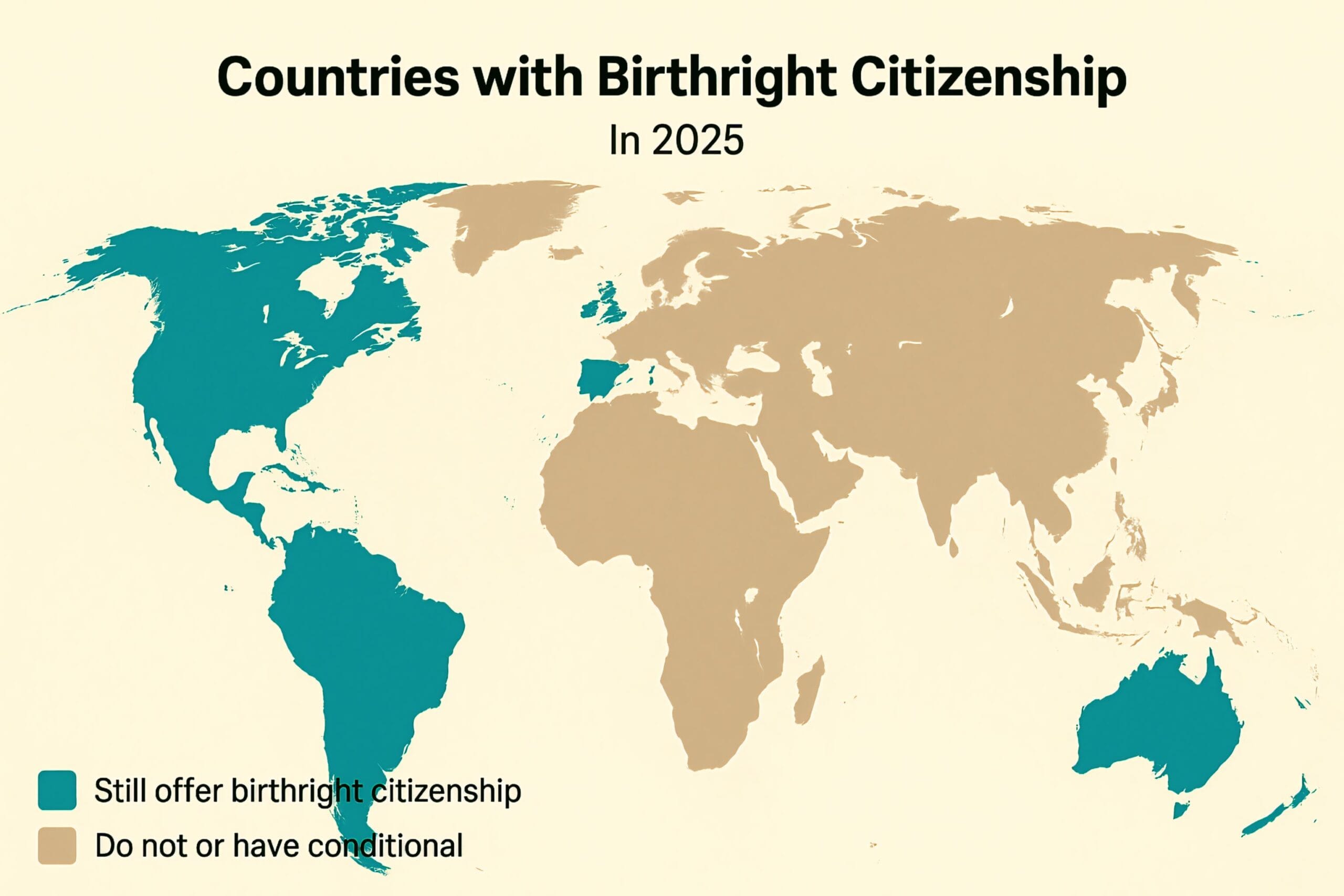Countries with Birthright Citizenship in 2025
What are the countries that grant citizenship at birth in 2025?
Sometimes, as a child opens their eyes to the world, they also receive something that millions of people struggle for years to achieve—citizenship. But does simply being born on the soil of a country make a child a citizen of that country? This question is still relevant around the world today, and in 2025, the topic has become even more sensitive. Today, only a few countries in the world grant citizenship to a child based solely on birth, regardless of the country of his or her parents or whether he or she is a legal resident in that country. Such a law is called birthright citizenship, and it is our topic today.
What is Birthright Citizenship?
Birthright citizenship is a legal principle that states that if a child is born in a country, that child automatically becomes a citizen of that country. This law is also known in Latin as “Jus Soli,” which means “right of the soil.” That is, simply because you were born on the soil of that country, that country considers you its own — without any documentation, without any conditions.
Countries that still grant birthright citizenship today (updated list as of 2025)
As of 2025, only a few countries in the world will grant citizenship unconditionally to a child born on their soil. Most of these countries are located in the Americas:
1. America
It is still the largest country in the world that constitutionally grants citizenship to every child born. Although this law is constantly debated in political circles, it remains in effect until 2025.
2. Canada
Canada is a developed, peace-loving country, where full citizenship is granted to a child at birth, whether the parents are tourists or refugees.
3. Mexico, Brazil, Argentina
Birthright citizenship laws are still in effect in these countries. Most South American countries maintain this law, and it is seen as a principle of humanitarianism.
Which countries have abolished this law?
Many countries around the world had this law in place before, but changes were made to it over time.
1) United Kingdom
The law changed in 1983, now only children whose parents are British citizens or have permanent residency are granted citizenship.
2) Australia
After 1986, birthright citizenship was abolished there as well.
Children are now granted citizenship only when their parents are legal residents.
3) India
This law has been abolished in India since 2004. Now a child born there gets citizenship only if at least one of the parents is an Indian citizen.
Why is citizenship granted with conditions in some countries?
Some countries have set conditions for granting citizenship, such as;
Countries with Conditional Birthright Citizenship in 2025
Country | Conditions for Citizenship |
Germany | At least one parent must have lived legally in Germany for 8+ years. |
France | A child can apply for citizenship at 18 if born and raised in France. |
South Africa | Citizenship is granted only if at least one parent is a legal resident. |
New Zealand | At least one parent must be a citizen or permanent resident of New Zealand. |
Malaysia | Strict laws; citizenship is not automatic even if born in the country. |
These countries don’t grant automatic citizenship by birth — legal ties and residency matter.
These conditions are set so that only those who are truly connected to that country are granted the right to citizenship.
A real example (human aspect)
In early 2025, a Filipino couple traveled to Canada for tourism. During the trip, their baby was born in a Toronto hospital. Amazingly, the baby was granted full Canadian citizenship — simply because he was born on that soil. That’s the power of birthright citizenship. If the same child had been born in another country, like India or Australia, he might not have had any legal status.
Why is this law so important?
Birthright citizenship is not just a legal benefit — it can be a life-changing blessing.
This law is a beacon of hope for children born to refugees, asylum seekers, or those in illegal situations.
- Education is provided
- Health facilities are provided
- The right to employment and a better future is provided
- Above all, an identity is provided
What is the global trend in 2025?
- The number of countries in the world that grant birthright citizenship is decreasing
- Many governments are considering tightening the law
- Political and social pressure could lead to changes in the law, especially in the United States, where election debates are ongoing
But there are still some countries that consider this principle a pillar of humanitarianism.
Conclusion: What should we understand?
In 2025, the world is moving towards a divided policy — some countries are closing down citizenship, and others are openly accepting it. If a child is lucky enough to be born in a country where this law exists, the very foundation of their life changes. Otherwise, that same child may spend their entire life without an identity. Birthright citizenship is not just a legal point — it is a recognition of justice, compassion, and humanity.





